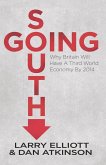The apparent success of a 'new' variant of social democracy has created considerable interest in the Third Way. This book synthesizes a core economic strategy from the most significant Third Way administrations. It explores the theoretical foundations to Third Way Economics , before evaluating its economic strategy against conclusions drawn from contemporary economics literature and the relative performance of contemporary left-of-centre governments. It additionally contrasts Third Way Economics with more traditional social democratic economic policy in adapting to the challenges posed by today's economy.
'Whyman has done political economists a commendable service in writing this book and in a way that non-economists will readily understand. It is well researched and written, extensive in its indication of key literature in the field and succeeds in walking the reader through the minds of neoliberal, Keynesian and Third Way thinkers.' - Shawn Donnelly, Political Studies Review








